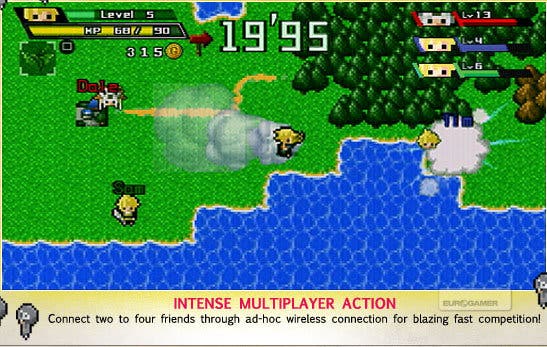Half-Minute Hero
30 seconds of fame.
While the number of game variables is relatively small, the fact they are condensed into such short missions means there's a lean sort of elegance to each, one emphasised by the scoring system that awards ranks for completing missions quickly and efficiently. A numerical code can be entered into the game's website to record you performance on a per mission basis, and thus the unlikely transformation of the JRPG into an arcade-style score attack exercise is complete. There are even meta-challenges to encourage revisiting missions: titles earned, for example, by not using any health items before the final showdown, which encourage you to replay the game using artificial, approach-altering restraints.
The tight, engaging core systems are helped along by a knowing, funny script that balances poking fun at genre staples with more general, universal humour. Each mission's overlord is a parody of a genre staple, given voice and character by a scriptwriter obviously relishing his task ("If the world can't understand snakes then...IT DOESN'T DESERVE TO EXIST," exclaims one slithery overlord, stating his motivation for world destruction).
Tactful, effective use of All Caps emphasis combines with sharp sarcasm to give the writing a snarky, internet-culture savvy tone, which, in the context of its dusty old narrative framework, works extremely well. Likewise, the in-vogue, blown-up 8-bit pixel art is entirely suitable and despite its rudimentary presentation manages to make the game appear both attractive and archaic.
The core JRPG 'Hero 30' mode is bolstered by another three, all of which take a similar time-management approach, but to different genre styles. Princess 30 is a delicious if simple shooter in which your feisty female character is hoisted onto the shoulders of a battalion of soldiers and must use her crossbow to take out enemies as they race her from pillar to post.
There's also Evil Lord 30, which is a basic real-time strategy game, with a slew of rock-paper-scissors-style units that must be deployed to defend an overlord's castle. Finally, Knight 30 is an action mini-game in which you must escort a character through a series of mazes. In each case, the extra modes are simpler than the main attraction, but nevertheless each packs a slew of missions and just as much heart and character into its approach.

While the initial sense of delight at the amount of content on offer and its immediate freshness and pace will take some time to subside, each mode does grow repetitive as it draws on. The brilliance of the designers' ideas laid down in the groundwork of each mode doesn't quite sustain over the long haul, even if the stories do a good job of drawing you towards completion.
But outside of each mode's core progression, the ideas and variety maintain across the package. Hero 300, a variant which unlocks later in the game, gives you more seconds to play with but removes the rewind feature, and strips you of all armour and money at the start of each mission, forcing yet more thoughtful use of strategy and approach. Finally, the ultimate challenge comes in Hero 3, which gives you just three seconds to save the world, in what must surely be gaming's ultimate speed-run.
It would be wrong to say Half-Minute Hero merely exploits nostalgia. Rather, developer Opus manages to unstop new springs of creativity from the over-farmed 8-bit landscape: clichés are turned into opportunities, and tropes are mined for humour and workable, hybrid systems.
The approach certainly doesn't render its inspiration redundant because, in reality, Half-Minute Hero is essentially an innovative arcade game dressed as a JRPG. Indeed, the similarities between the two are limited to aesthetic, tone and theme: underneath the parody, entirely different systems hum. For that reason, while Half-Minute Hero will be best appreciated by gamers familiar with its surface inspirations, it can nevertheless be savoured by anyone.
Half-Minute Hero is due out for PSP in Europe this February courtesy of Rising Star Games.

